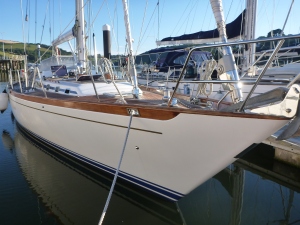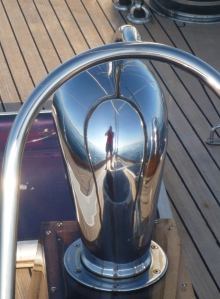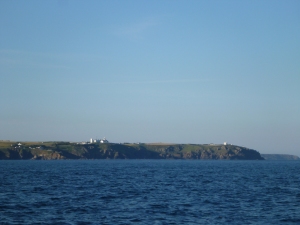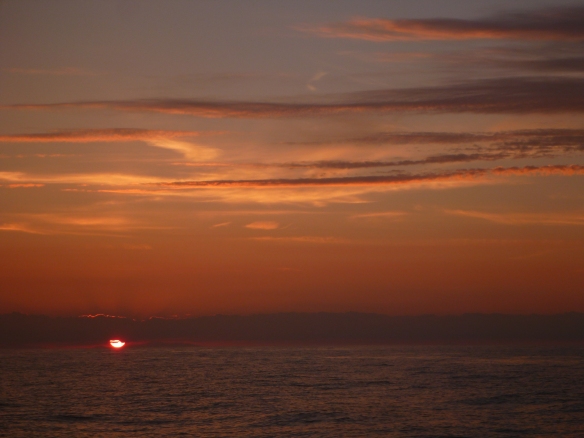Where to begin? It’s been a long time it seems since completing my Yacht Master assessment in early June. I’ve been trying to get some time to sit and reflect on the whole thing and today sat on a train to Dartmouth to jump on a very lovely 60 foot Cutter for a week seems like the perfect time.
There are so many factors involved in the whole intensive Yacht Master course, physical, a need for strength, stamina and restraint, emotional control and patience, intellectual, technical and practical skills and finally an ability to live in very confined conditions with relative strangers. It’s very hard to know where to start when summarizing the experience. I’m sure many would say it’s just a jolly on a boat for four months with like-minded folk, which to some extent is true, however the serious (for me) investment of time and money, separation from a very comfortable home life and wife with a goal of developing a career as a professional skipper kept me very focused throughout. This focus helped and hindered me in many respects. Not everyone on the course shared common goals as was to be expected, or enthusiasm, which did come as a surprise since the course isn’t compulsory!! The diversity of characters and abilities really did provide a great learning experience.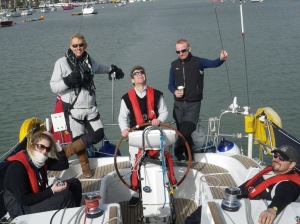
I’ll break this thread down into sections based on the different aspects of the course, not a chronological summary (I did post some info as we went along, not as much as I would have liked, but time, energy and access to the internet did dictate this).
The COURSE.
 The overriding thing I’d say is that the PST course at Hamble is not there to teach you how to sail a boat. I know that sounds strange, but really its there to develop an ability to skipper (with all that entails). I am not saying that basic sailing skills are ignored, but if you want to learn about the finer points of sail trim and making a boat go fast, look elsewhere. What is absolutely drilled in the course is an ability to safely navigate anywhere and handle a boat in close quarters under sail and power and to develop an ability to work as a team in doing so. They don’t sell this as a ‘sailing’ course in my view, so they are consistent in what they are offering and delivering. I think it’s truly excellent way to instil key skills to the point they become second nature.
The overriding thing I’d say is that the PST course at Hamble is not there to teach you how to sail a boat. I know that sounds strange, but really its there to develop an ability to skipper (with all that entails). I am not saying that basic sailing skills are ignored, but if you want to learn about the finer points of sail trim and making a boat go fast, look elsewhere. What is absolutely drilled in the course is an ability to safely navigate anywhere and handle a boat in close quarters under sail and power and to develop an ability to work as a team in doing so. They don’t sell this as a ‘sailing’ course in my view, so they are consistent in what they are offering and delivering. I think it’s truly excellent way to instil key skills to the point they become second nature.
There are really three things going on with the PST course. Whilst the end result is of course consistent with the syllabus, the differing elements sometimes conflict along the way.
Firstly, to the absolute credit of Hamble School of Yachting (HSY). Their ‘way’ of doing things and their attention to making sure you can handle the day to day things a boat and crew can throw at you is utterly excellent. There are a million different ways to do things on a boat, HSY’s is one, BUT it works and it works very well whether you are a seasoned sailor or a total newbie. This single solution approach is often the criticism thrown at schools offering ‘fast track’ courses, but I argue that the principles instilled at HSY are a starting point for your journey as a sailor. If you never sail any other way, with any other people it will work, but you WILL learn as you sail with others who do things differently, but equally (I can attest to this already) you might just teach an old dog a new trick along the way!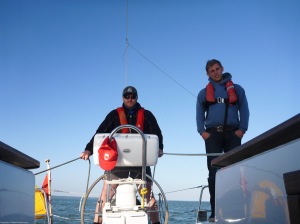
Secondly, there is the need to complete certain ‘tickets’ along the way. Naturally, the point of doing a course is to obtain a certification. Whether for personal reasons, or like me to enter an industry, the only national body in the UK that is recognised is the RYA. In my view there is a void here between the excellent quality of training HSY offer and the under developed and pretty poor courses the RYA offer.
 I have thought long and hard about this over the past months and don’t say this lightly. I think, unless you are naturally very gifted, to be presented with RYA theory courses without reading a long way round the subjects (like navigation, weather, collision regulations) almost ignoring the course materials supplied you’d come out a very poorly prepared skipper indeed. This is doubly frustrating if you intend to enter the industry and want reference materials to build a library. The RYA course materials are laughable. To build a library around the course requires substantial additional investment. Be prepared.
I have thought long and hard about this over the past months and don’t say this lightly. I think, unless you are naturally very gifted, to be presented with RYA theory courses without reading a long way round the subjects (like navigation, weather, collision regulations) almost ignoring the course materials supplied you’d come out a very poorly prepared skipper indeed. This is doubly frustrating if you intend to enter the industry and want reference materials to build a library. The RYA course materials are laughable. To build a library around the course requires substantial additional investment. Be prepared.
Simply understanding what it is you are being asked to learn, or in the case of practice questions answer is an exercise in translation. The materials present inconsistently and are often without clear learning objective. All that said and again to recommend HSY, the theory teachers on staff are excellent, well experienced genuine sailors who can fill in the gaps in the RYA trail.
I was lucky enough to have some spare time prior to beginning the PST course and spent a lot of time reading and writing notes on the key areas of study. For anyone considering an intensive course, if you want to take the theoretical side of things seriously and really understand them, I suggest you do the same. Ironically, the theory texts the RYA publish on weather and navigation are in fact very good. Why they cannot incorporate their obvious knowledge and ability into producing a structured syllabus and course materials is beyond me.
 The final element (intrinsically linked with the second) is the need to build up candidates mileage to allow them to take the assessments along the way. The experiences learned in actually planning and making passages through the course are essential. Weeks of bashing about the Solent on twenty-mile trips are great for skill development, but there is nothing like a twenty-four hour sail away from land to make you realise what is important in running a boat. I referred to these week-long ‘distance sailing’ trips as work hardening experiences. Whilst never in a position of danger, using planning, navigational, sailing and living skills aboard at all times of day and night really do settle them into the core.
The final element (intrinsically linked with the second) is the need to build up candidates mileage to allow them to take the assessments along the way. The experiences learned in actually planning and making passages through the course are essential. Weeks of bashing about the Solent on twenty-mile trips are great for skill development, but there is nothing like a twenty-four hour sail away from land to make you realise what is important in running a boat. I referred to these week-long ‘distance sailing’ trips as work hardening experiences. Whilst never in a position of danger, using planning, navigational, sailing and living skills aboard at all times of day and night really do settle them into the core.
The BOAT SKILLS.
To plagiarise slightly,
Things you need to do to be a skipper:
Keep the water out of the boat
Keep the people in the boat
Don’t crash into anything
Get to your chosen destination (ninja level)
Get there on time (yoda level)
What else is there really?
Ok, so what do you actually learn? I should explain I joined the course with little yachting experience. I sailed for a time on dinghies inland some years ago, so my wind/sailing knowledge is OK, but I had no idea about displacement yachts or water that moved about, changed heights and wasn’t smooth. I had done one yacht trip across Biscay some years previously as a last minute crew, so I had some clue about being on a boat but not much as it was a pretty big catamaran. On that I’d lived on my wits, my ability to learn fast and remain calm in pretty awful conditions!
The course is run in modules, starting at ground zero mod 1 takes you to RYA day skipper, mod 2 up to coastal skipper and the final module prepares you for the Yacht Master coastal assessment.
The modules loosely follow the requirements of the RYA to complete the stages of comp crew etc, but go way beyond that in practical application. From the first day, you are out on the water for a week sailing mostly round the Solent getting to grips with all that entails. Loading and stowing the boat, preparing for sea, slipping lines, pilotage, passages, mooring up is all immediately brought to your attention. In our case the whole crew was essentially on the same experience level, some more practiced, some more confident, but it was all down to the crew of five to make it happen with the instructor there is guide and assist, not really to lecture. We were straight into night sailing, night pilotage and close quarters handling. The bar was pretty high, in fact I know we did things in week one that qualified coastal skippers shy away from unless forced. Night pilotage under sail up to Bucklers hard on a misty frozen night is not for some at all, yet we did this on our first evening on the boat. As I say, the bar seemed pretty high!
Starting in February, you meet the challenges of cold and damp immediately and learn pretty quickly to look after your living space. It’s notable as we prepared each boat from week to week our ability to create a working living space became second nature, but so did our disbelief at how badly others had treated the boats before we took them over. The discipline of knowing this is your home for four months, not just a few nights really helped and it’s something I’ve taken forward in all subsequent boats…it’s a great lesson.
Navigation and pilotage skills are developed throughout the course, starting simple, with 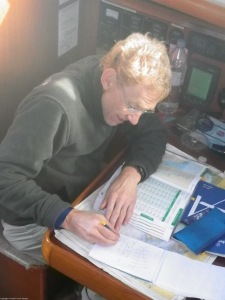 small steps, you quickly develop a method that works and first principles get built on progressively throughout the weeks aboard. By the end of our time our teams ability to navigate and pilot the boat in the dark, or in ‘blind’ situations still fills me with great pride.
small steps, you quickly develop a method that works and first principles get built on progressively throughout the weeks aboard. By the end of our time our teams ability to navigate and pilot the boat in the dark, or in ‘blind’ situations still fills me with great pride.
An area of great focus on the course is close quarters boat handling, especially under power. Like flying, the biggest risks in sailing are the take offs and landings. Moving 10 tonnes of flighty wind driven boat around a marina full of floating bank balances focuses the attention! The course really drills into you the influencing factors on the boat and how they affect how to approach and safely complete what for some are nerve wracking maneuvers in close quarters. This is another area where the systematic approach of HSY with a ‘system’ of evaluating the conditions allows you to plan an exit or entry to your best advantage to keep you safe. You may make a mistake, it may not go to plan, but you’ll know what factors are trying to force a problem and how to turn them to your advantage. Being able to safely move your boat around, with minimal fuss acting a team of helm and crew really is a great feeling. Especially when you have an audience of other crew around and they come over to say how well you moored up, or look in envy as you smoothly step off the jetty with a crew still smiling!
 Safety is naturally a big area of concern for all on board. An on going process of drilling procedures both for active and passive safety on board makes looking after the boat, the crew and oneself second nature. Delivering and receiving boat briefings and making safety checks along with a huge focus on deck safety and man over board procedures are almost a daily occurrence. Watching other crews ignore basic lifesaving skills in and around the ports in the Solent really make me shiver now! Practical skills are backed up with a great one day safety survival skills day run on land (and in a pool). The guys that deliver this course have been there and done that in military environments and don’t pull punches on the seriousness of a sinking boat or man in the water. Practical skills in the pool bring home the need to be fit healthy and prepared for the worst. The biggest lesson? DON’T END UP IN THE WATER!
Safety is naturally a big area of concern for all on board. An on going process of drilling procedures both for active and passive safety on board makes looking after the boat, the crew and oneself second nature. Delivering and receiving boat briefings and making safety checks along with a huge focus on deck safety and man over board procedures are almost a daily occurrence. Watching other crews ignore basic lifesaving skills in and around the ports in the Solent really make me shiver now! Practical skills are backed up with a great one day safety survival skills day run on land (and in a pool). The guys that deliver this course have been there and done that in military environments and don’t pull punches on the seriousness of a sinking boat or man in the water. Practical skills in the pool bring home the need to be fit healthy and prepared for the worst. The biggest lesson? DON’T END UP IN THE WATER!
The LIFE SKILLS.
Right, as a pretty settled early forties married Yorkshire man, it doesn’t need over stating that I have opinions and don’t mind expressing them. I also listen however and react to social situations that are uncomfortable. Over the length of the course we had many very diverse characters on board with very different goals. All of us squeezed into 36 foot French yoghurt pots that were designed for expedience not comfort or living for weeks at a time. Often wet, always cold and tired, having or learning to muck in and allow rough edges to get knocked off was essential. For most of the duration of the course, we got on. Naturally there were moments for us all. Sharing living spaces, sharing cramped sleeping spaces often didn’t allow for much if any personal space. There was an overriding assumption that we were always a group, we ate, drank and did things together. To break out was sometimes hard, but usually essential for sanities sake.
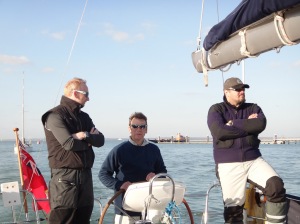 You think you know yourself pretty well until you are placed in an environment like this. Character traits rise, other things fall away. What you think was important isn’t and other things become essential. It’s all valuable experience to anyone planning to do any long distance or regular sailing however. Holiday makers? Don’t put your selves through this, there is little point.
You think you know yourself pretty well until you are placed in an environment like this. Character traits rise, other things fall away. What you think was important isn’t and other things become essential. It’s all valuable experience to anyone planning to do any long distance or regular sailing however. Holiday makers? Don’t put your selves through this, there is little point.
In summary.
From my point of view, the HSY PST course gave me the keys to a new career and a driving license. You won’t walk out of a course like this into a paid job of any worth, anyone who suggests otherwise is selling you something!! The industry (especially the delivery industry) will view you with skepticism and you are an unknown quantity. You need mileage and experience, not to mention contacts to get credible work. I chose to get involved with a very reputable Yacht delivery company. I am spending a number of months working for them as an unpaid first mate. Primarily to prove myself and start skipping for them, but also to build mileage and experience should I need to look elsewhere at the end of this time.
Its been a great learning experience all around, I’ve met some great people and developed a select number of very good new friends. Its changed me professionally in my outlook to managing people but equally something in me has changed too. Somehow, the stresses imposed on us all in modern Britain are less acceptable. That said, where I used to rant against this, I have learned to work around most of it and laugh at the rest with resignation. A small boat is no place for outbursts and self imposed stresses. So maybe it turned out to be a jolly in a boat afterall?
Finally, a huge thanks to:
Isabelle for putting up with six months of me away and a year of not earning
All the staff and especially the core of instructors at Hamble School of Yachting that work with the PST crews. You’ve all become good friends and your efforts go way beyond whats required.
My cousin Stu and his understanding other half Jo, for a room and a washing machine on occasion. Not to mention a place to escape to when reality fixes were required.
Dennis, for being such a fun guy to be around. (Congratulations on your marriage and relocation) and Jack for being a bit nuts and making life a great laugh. I hope to see, drink and sail with you both again sooner rather than later.



